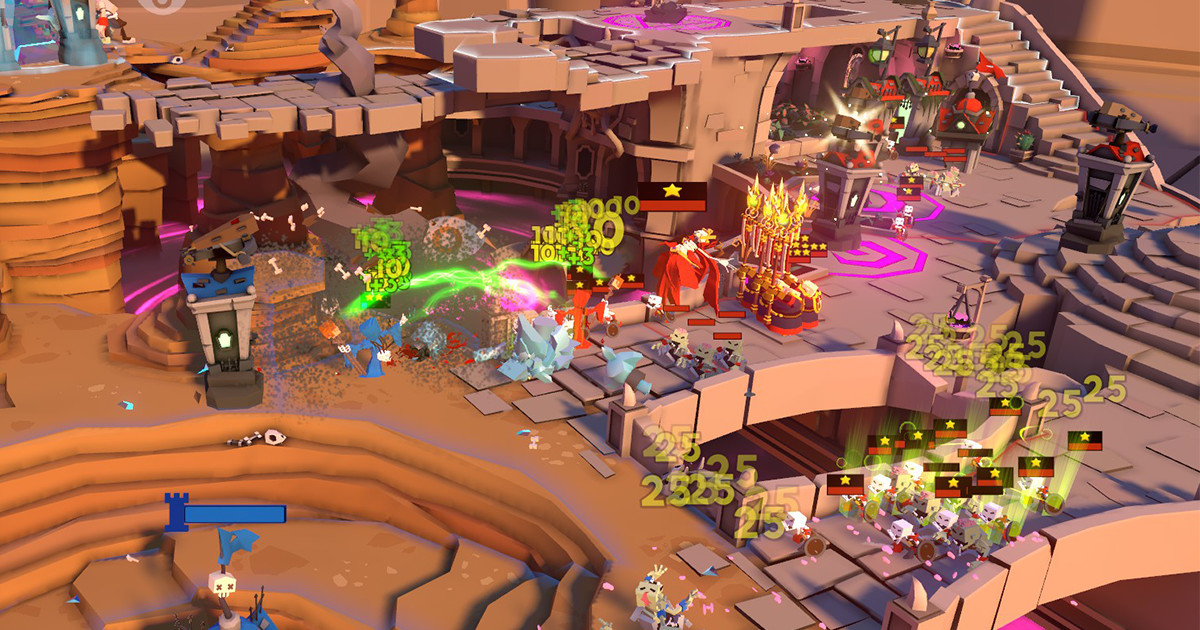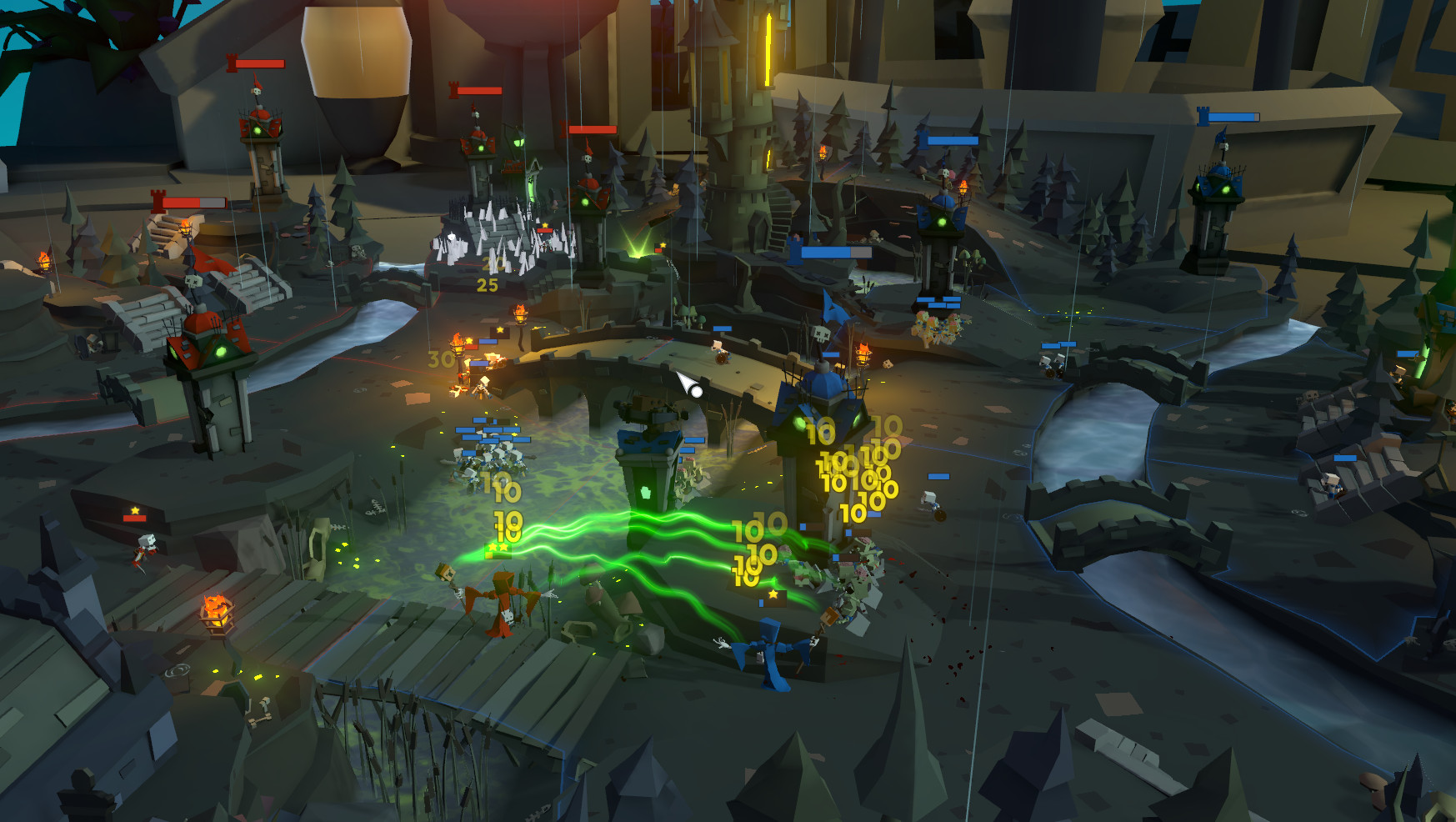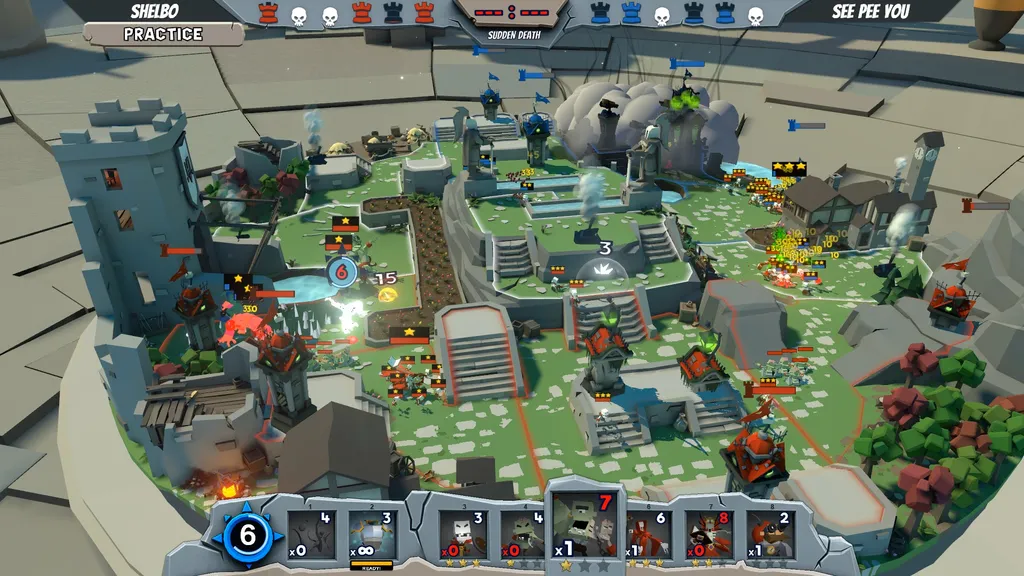Tabletop Gods is an odd little title that casts you in the role of a god trying to settle things with a pantheon of other gods. You see, heaven is a place worth fighting for, and in order to truly run the place you have to defeat every god who seeks to challenge you. Rather than settling things yourselves you all decide to throw troops at towers and see what sticks. Well, ideally nothing sticks, and the towers get destroyed, but that’s not how the saying goes, is it?
The fact that you are a god is of little relevance outside of the setting itself. You and the rest of the divine all huddle around a round table to watch your troops duke it out with one another. Each match starts off with a bit of preparation. You have time at the beginning of each round to lay traps and towers down and also to change your loadout. You have access to two spell slots and six unit slots, each of which can be changed to fit your battleplan.
As you don’t have any direct control over your units, the majority of the strategy comes in this stage. Rather than trying to figure how best to flank your opponents, the tactics are more reliant on trying to figure out which of your units are useful, and which aren’t. While there is an element of this in each match, it is important to take your most useful units with you into battle.
There is a limited amount of each unit that can be summoned at any one time, so you want every single unit you have selected to have the greatest impact. Of course, the decisions you make in battle are relevant too, though it is mostly a matter of figuring out what to spend your mana on and where to deploy it.
Your mana regenerates slowly over time which allows you to continue summoning new units or casting powerful spells. Managing this is the biggest challenge you will face outside of your actual opponent. As towers get destroyed, you’ll be rewarded with faster mana generation. This in turn allows for more aggressive play as you tighten your grip on the battlefield. Initially, you can only summon units within your own areas, but every time a tower is destroyed that area becomes a neutral area that either player can spawn units in.
Summoning units is a very simple affair, you simply have to select which one you want and then use the pointer to select the area. If it is a ranged unit then you’ll be shown where they can attack, the same is true of towers you create in-between rounds too. This lets you see what kind of area you have covered already; it also makes attacking towers with stationery archers far simpler as it removes the guess work.
It is at this point that the game will lose some people though. The inability to control your units is going to be far too hands-off for the hardcore strategy players. However, it will make it more appealing to players who just like to set things in motion, rather than guiding every single action in a battlefield.

The movement within VR is very effective. You can raise and lower yourself to see the table from different angles, rotate around the battle, and even wade in for a close look. Where this really shines isn’t in the matches, but within the spectator mode. Rather than viewing things from a birds-eye view, you can use several special camera angles to get much closer to the action. Watching a swarm of skeletons attempt to take down a hulking zombie is far more impressive when they are right next to you.
This leans into the Arena mode itself, which allows up to 8 people to be in a room together where you can battle or watch the fights that are already going on. This is definitely the best way to experience the game as it gives the truest tabletop experience. Being stood around a battlefield chatting to other people gives one of the most true to life feelings I’ve ever had in VR, and it is wonderful.
While there is a single-player campaign, it doesn’t match the enjoyment to be had in multiplayer at all. It does serve as a good way to get used to the different units and factions though as a lot of experimentation is necessary to find your ideal loadout. Messing around with different combinations of troops is great, and the AI in Skirmishes is good enough that you can get a proper feel for how your army will perform against other players too.

Tabletop Gods is a quirky little strategy game that offers a lot of fun for those who are happy to take a more relaxed approach to the genre. The variety of units, spells, and factions helps to make your army feel unique, and the fast pace of each match is a welcome change to the hour-long slogs that can often occur. Players who want a deep and fulfilling experience are unlikely to enjoy the game, but for everyone else it offers a fun way to play at being god.
Tabletop Gods is out now on PC for $19.99 with optional VR support. Check out these official review guidelines to find out more about our process.


























